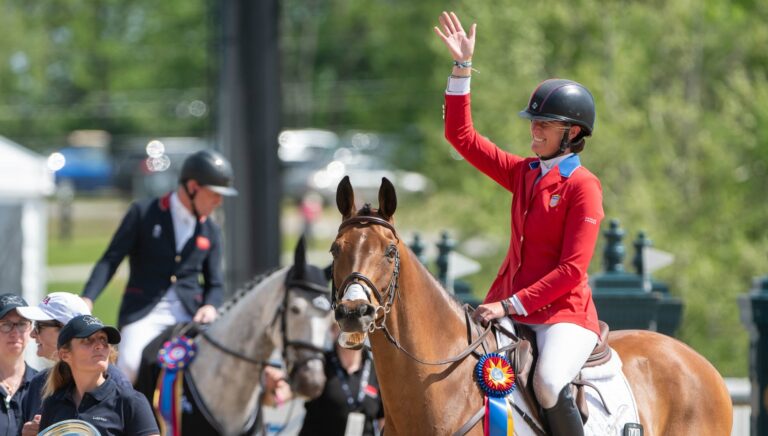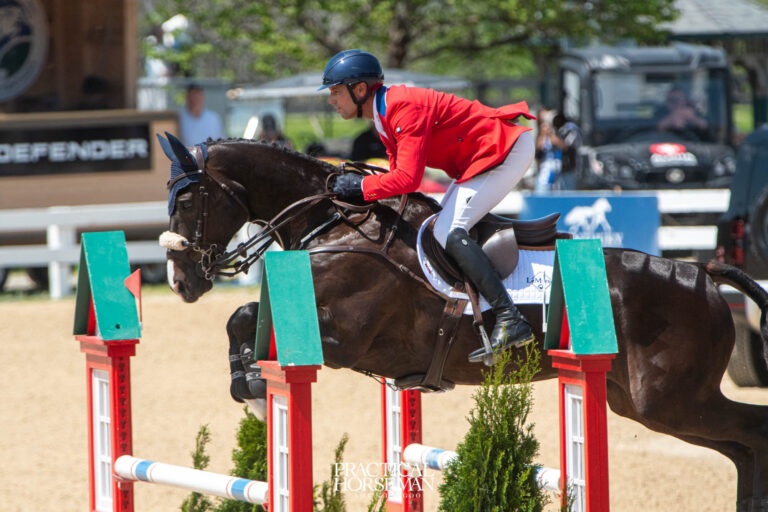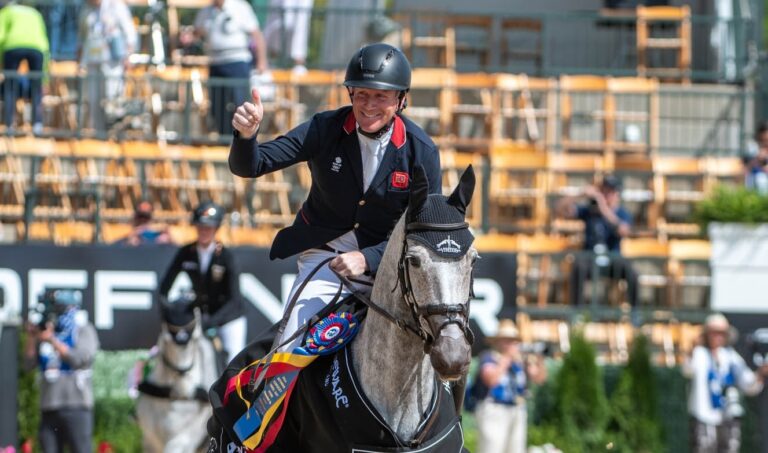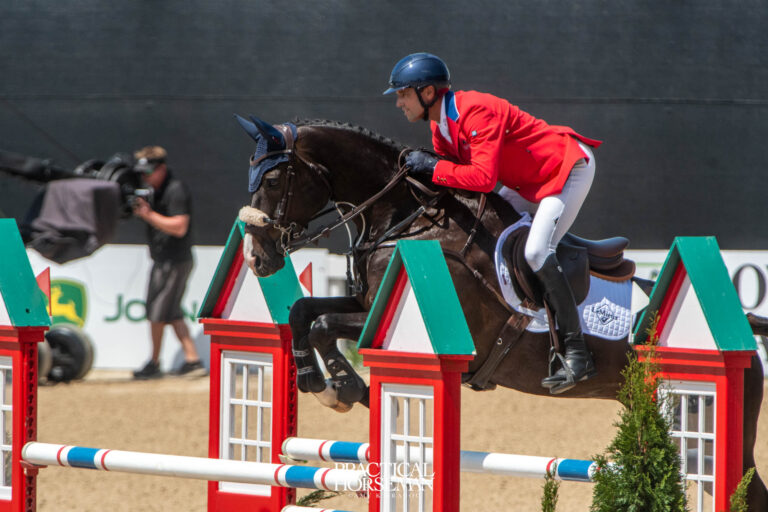
CCI5* rider Doug Payne is entered to compete in the 2024 Defender Kentucky Three-Day Event CCI5* with Quantum Leap.
In anticipation of this year’s Kentucky, we revisited a podcast conversation that we had with Payne in 2021. We’ve excerpted a few of our favorite answers from Payne about dealing with disappointments in the sport, handling competition nerves, his training philosophy and more.
Q: What aspect of eventing do you enjoy the most?
Doug Payne: It’s cross country without a doubt. That is the heart and soul of it. There’s nothing quite like, especially once you’ve got a horse that you’ve had for a while and you’ve got a really good relationship with. Attacking a course is a lot of fun.
Q: Can you talk some about the most important or favorable wins in your life?
DP: I’m not so sure it ends up being one particular competition that stands out, but I think the overarching thing is that almost all these horses we bought as weanlings. To see any of them succeed at whatever level they are, that actually is the most fun for me.
I could get just as excited about a 5-year-old or a 6-year-old that’s winning at a Prelim event as I would at a horse winning a five-star. If they’re really, truly successful wherever they are in their progression, that’s actually what excites me more.
It’s not so much like I have to win Kentucky. Yes, I would absolutely love to win Kentucky. But it’s not my, the be all end all for sure.
Q: How do you handle disappointment or setbacks in the sport?
DP: If I go in and make a mistake, it will drive me to work even harder at home to make sure that that mistake doesn’t happen again. And like we always think with the horses in their developmental process, if you make a mistake in your progression of learning and getting better, that’s no big deal. But if you make the same mistake twice, that would totally kill me. But if I’m making different mistakes, that is something that I can continue to learn and grow and be better from. So it wouldn’t be something you’re going to pout that you lose. It’ll just be something that you’re going to be up even earlier the next day, working even harder to make sure that that doesn’t happen again.
Q: How do you manage nerves before competitions?
DP: If you’re not getting nervous, something’s seriously wrong. There’s an aspect of that nervous energy that is going to make you sharper and more focused and fine-tuned to allow your performance to be the best. Early on, I had more trouble. I don’t know what we’d call it—debilitating nerves. Like you’d end up making mistakes because you’re nervous. … So I was told at some point that you’re at some big stage, some big competition that seemed meaningful at the time. And if you’ve had the ability to develop the horse to that point, you’re going to be able to do that again and again. You’re not going to win every single time you go out. If you do make a mistake, learn from that, make it better and come back again. It was just a means for me to remove the significance of the one particular competition, knowing that I intend to be back there over and over. Indefinitely.
Q: Do you have any routines before big competitions?
DP: As far as routines, it’s kind of just the norm. We’re just glorified carnies. Basically, we’re on the road all the time, and in some ways, I operate best in a slightly chaotic schedule just because there’s not a whole lot of time to think about one particular performance on one particular day.
Q: What is your philosophy when it comes to training horses and students?
DP: As far as training with the horses, I try to give them as much time as possible at all times to figure out what’s being asked. I would really be tough on somebody if they were putting a ton of pressure on the horse to learn something really quickly. But I think you can expose them. My goal is to expose them to a number of either exercises or training tools to help show them the best way to utilize their talents. Assuming that they’re giving it a genuine try, I will give them as much time as they need. Generally speaking, if you go in a quiet way and they can figure it out, they actually progress pretty quickly.
My teaching style is probably quite similar to the horses. If I’m instructing riders, I think it’s my job to show them how best to listen to their horses and how best to put their horses in a position that they can succeed in whatever it is they’re trying to accomplish.
Q: Do you find that there’s one thing in particular that students typically need to work on?
DP: On the flat, I would say most people don’t ask enough as far as having enough energy and they tend to ride too conservatively—almost trying not to make a mistake rather than sort of confidently going all in for it.
As far as jumping, I do a ton of small jumps that require a lot of agility and footwork exercises. Because I think that there often is going to be a time that you feel as if all of a sudden, you’re in trouble. You’re in a spot, you’re in a tricky situation, the striding isn’t right. Maybe on a cross country, the horse slipped on the turn or whatever it might be. I want to have a “get out of jail free” that you can sort of slow everything down, and the horses will reliably be sharp on their feet and sort of pop off the ground. I think often people end up on the too long and strung out and running side of things and the ability to adjust is lost. Then that’s often where people and horses get in trouble .
Q: When you’re riding, do you have a favorite exercise for yourself and whatever that exercise may be?
DP: The biggest thing, if you can figure out a way to do it, is get a set of mirrors because you will have an absolutely free riding lesson every day. It’s just one of those things you see yourself doing it. Whatever bad habit it might be or whatever the perception is you can be way quicker about fixing it. And I think it’s more impactful if you can see it for yourself.
Q: What advice would you give your younger self?
DP: Early on, I probably was not near as coachable as I should have been. As you get a bit older, you try to glean any little bit of insight from anybody and sort of turn it into your own. And in all honesty, I was probably a bit too cocky earlier in my life to do that.
To listen to the Practical Horseman Podcast episode with Doug Payne, click on the “play” button below.
Doug Payne has been A member of the U.S. Pony Club since age 7 with an ‘A’ rating. His passion for horses took precedence over his mechanical engineering degree from Rochester Institute of Technology. Payne’s track record includes a U.S. team gold at the 2019 Pan American Games in Lima, Peru, with Starr Witness. The same year, he and Vandiver secured fifth place in the Kentucky Three-Day Event CCI5*. The crowning glory of Payne’s career came in 2020 when he and Vandiver were named to the U.S. Eventing Team for the Tokyo Olympics.
Payne also competes in show jumping and the hunter ring. Additionally, he has competed to Intermediaire I in dressage and earned a USDF silver medal. Payne lives with his wife, Jessica, and their two children, Hudson and Abby, in Rougemont, North Carolina.
Thanks to Mane ‘n Tail Equine for our coverage of the 2024 Defender Kentucky Three-Day Event. It includes lead-up events, rider interviews, competition reports, horse spotlights, photos, videos and more.










